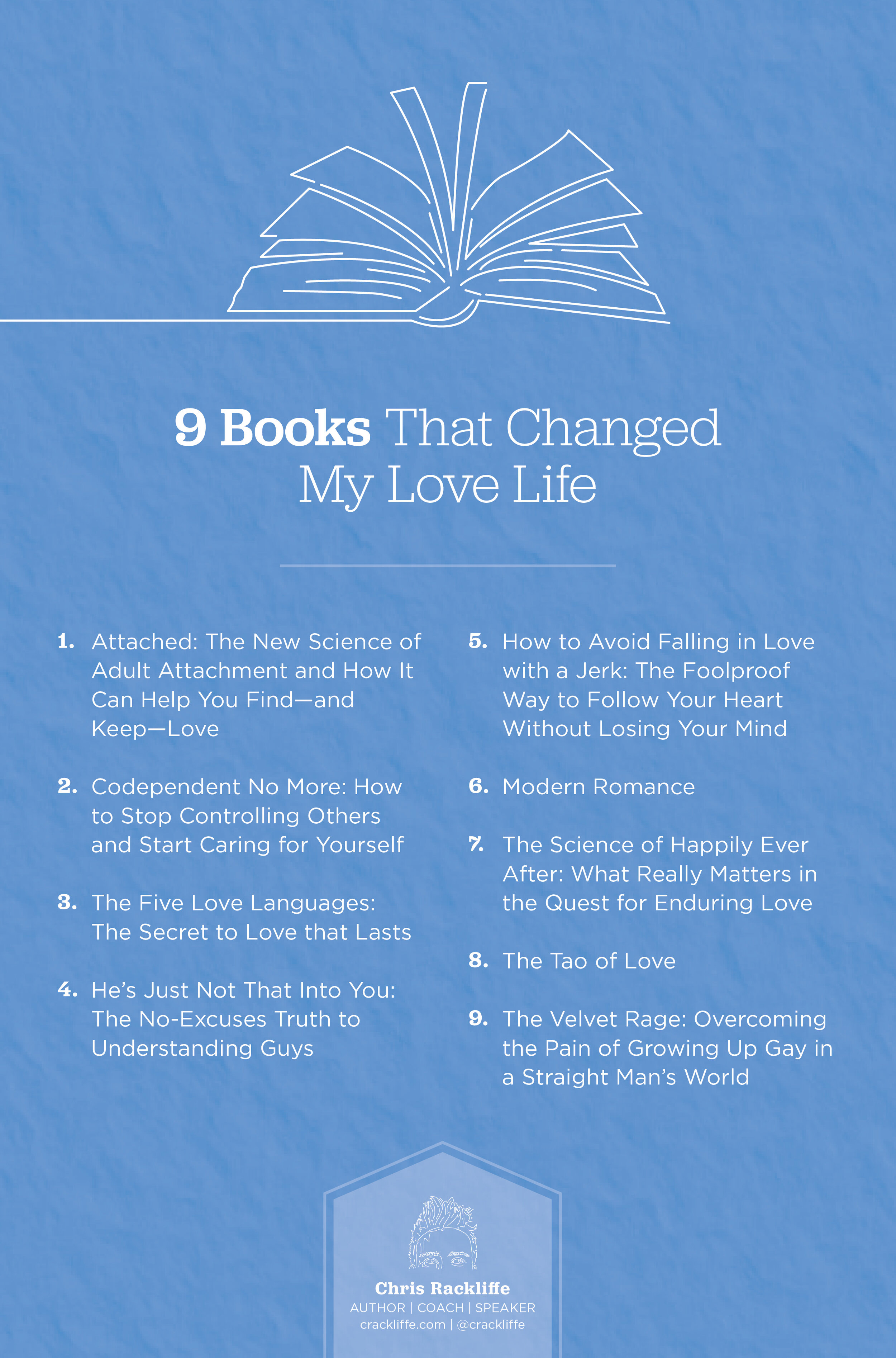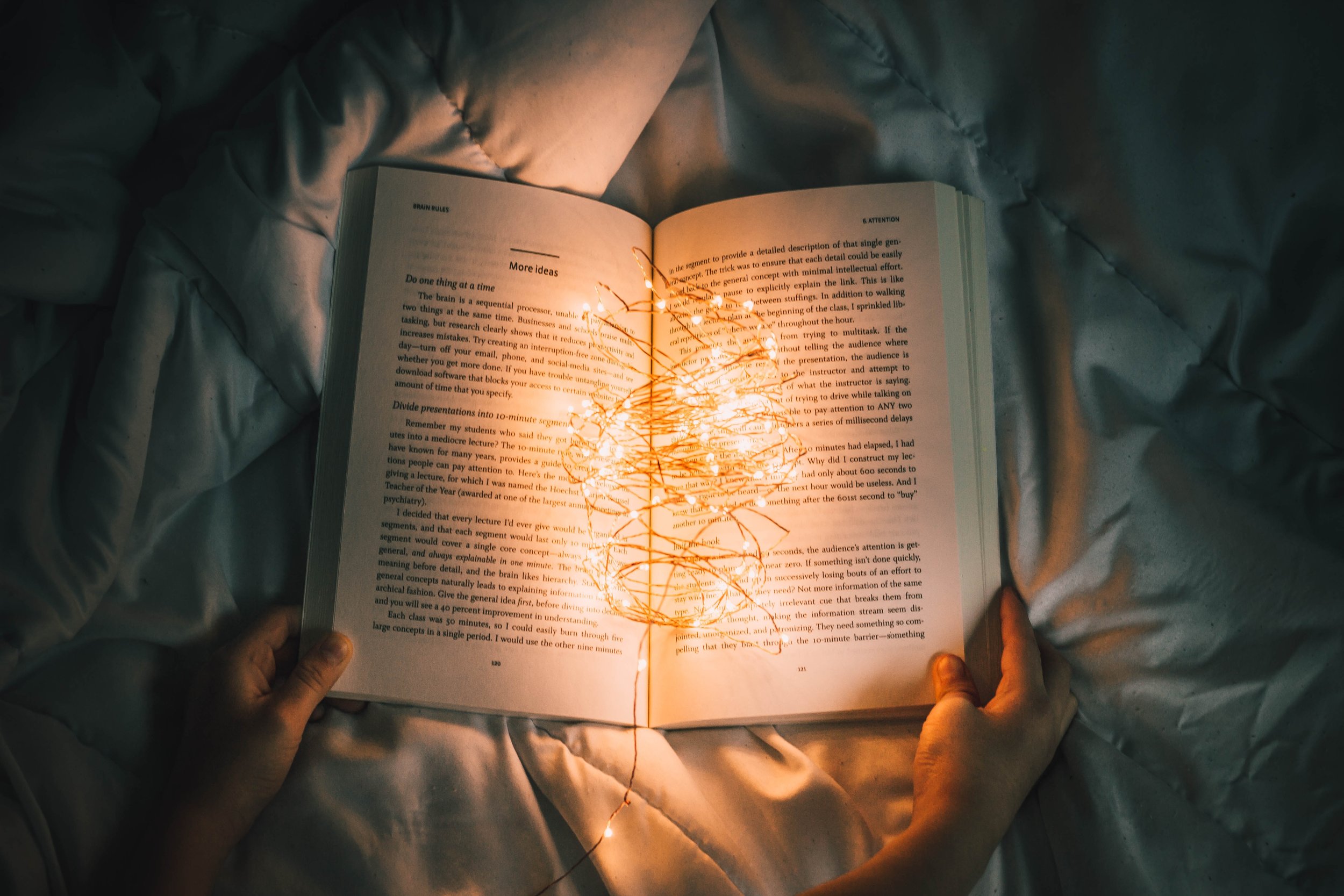9 Books That Changed My Love Life

It was the conversation that changed the trajectory of my love life.
“Have you heard of the five love languages?” My friend asked me over wine at his place one evening.
“No, I haven’t,” I said through a furrowed brow. “What are the five love languages?”
“There’s a whole book about them that basically explains how we prefer to give and receive love. You should check it out,” he said.
His suggestion couldn’t have come at a better time.
Jaded by dozens of dates that didn’t seem to be building toward anything meaningful, I was looking for some fresh perspective in my love life. It arrived when The Five Love Languages finally landed on my doorstep. Once I cracked it open, I couldn’t put it down. In awe of its simplicity and clarity, I reinterpreted and reevaluated all of my close relationships—personal and professional—meticulously trying to determine how to improve them for the better.
It worked wonders.
I grew closer to my coworkers. I learned how to be a better friend. I became more vocal and active in my family. Above all else, I finally understood what I needed from a romantic partner.
Empowered with this newfound knowledge, a short while after reading the book, I fell in love—not once, but twice!
It was that transformational.
Franz Kafka once said, “A book must be the axe for the frozen sea within us.” If that’s true, then The Five Love Languages was the molten metal that freed my frozen heart inside. Like a rose stripped of its thorns, the beauty had been extracted and cleaned of its bitterness. A part of me that had been locked away was set free.
That’s the power of an illuminating lesson. That’s the power of a well-timed recommendation. That’s the power of a good book.
There’s a reason the phrase “turn the page” resonates with many people. With new knowledge comes a fresh start. The lessons we learn are the start of a new chapter—paperback bricks upon which we can build new beginnings. And so it was with me. But it wasn’t the only time that’s happened. I’ve read a total of nine books that changed my love life, each of them helping me to see with a fresh set of eyes and feel with a freshly thawed heart.
I know they have the power to do the same for you.
I’ve outlined them below.
May you read with an open mind, and in return may they help you feel with an open heart.
Editor’s Note: I have not been paid to endorse these books and have personally curated this list. However, I get commissions for purchases made through the Amazon links in this post.
9 Books That Changed My Love Life
1. Attached: The New Science of Adult Attachment and How It Can Help You Find—and Keep — Love
Authors: Dr. Amir Levine, M.D., Rachel S. F. Heller, M.A.
Five-word synopsis: Attachment determines how you bond.
Why it changed my love life: One of 13 books that changed not just my dating life but my existence as a whole, reading Attached was like looking into a mirror that showed my past, present, and future. I read it cover to cover in just two days, quickly devouring its truths as they laid bare my entire dating history in black text on crisp, white pages.
I never felt more seen in my life.
I learned that having needs doesn’t make me needy. I learned that being insecure in a relationship is common. I learned that my childhood was having more of an impact on my adult dating life than I ever could’ve realized.
Discovering your attachment style is a watershed moment. It will help you understand your needs in a romantic relationship. It will help you explain why you’ve behaved in certain ways in specific dating situations. It will illuminate dynamics that you never realized were at play.
It’s an a-ha moment in every sense of the phrase.
Do yourself a favor and check out this life-changing book. It has the potential to help you make sense of your entire dating history. So you can find—and keep—the love you need and deserve.
My six favorite quotes:
“Attachment principles teach us that most people are only as needy as their unmet needs. When their emotional needs are met, and the earlier the better, they usually turn their attention outward. This is sometimes referred to in attachment literature as the ‘dependency paradox’: The more effectively dependent people are on one another, the more independent and daring they become.”
“The trick is not to get hooked on the highs and lows and mistake an activated attachment system for passion or love. Don’t let emotional unavailability turn you on.”
“True love, in the evolutionary sense, means peace of mind. ‘Still waters run deep’ is a good way of characterizing it.”
“A general word of advice: It’s always more effective to assume the best in conflict situations. In fact, expecting the worst—which is typical of people with insecure attachment styles—often acts as a self-fulfilling prophecy. If you assume your partner will act hurtfully or reject you, you automatically respond defensively—thus starting a vicious cycle of negativity.”
“As a rule of thumb, sensitive topics—like meeting a partner’s children—should always be on the table.”
“Effectively expressing your emotional needs is even better than the other person magically reading your mind. It means that you’re an active agent who can be heard, and it opens the door for a much richer emotional dialogue.”
2. Codependent No More: How to Stop Controlling Others and Start Caring for Yourself
Author: Melody Beattie
Five-word synopsis: Take care of you first.
Why it changed my love life: This groundbreaking book has helped millions take back the reins of their love lives—and for good reason! It’s packed with page after page of quotable sayings, relatable anecdotes, and real-life wisdom for anyone who’s struggled with codependency issues. One of the biggest eye-opening moments for me was learning that traumatic experiences and addictive patterns have a high correlation to codependent behaviors. If you or someone you know has struggled with addiction, this book is a powerful wake-up call. At least I know it was for me. My mom was an alcoholic and died when I was 18. My sister was a drug addict and died when I was 31. While I thankfully don’t have substance dependency issues, relating with these key figures in my life wired me to think that I was responsible for another person’s happiness—that if I worked harder or gave more or put in extra effort that I would be able to save them and improve their lives. Codependent No More showed me that the opposite is actually true: No matter what I would’ve done, I couldn’t have saved either of them. They were responsible for their own lives. Their inability to seek treatment to get better wasn’t a reflection in my ability to help others. This knowledge has helped me tremendously in my romantic relationships. I now know that my inclination to worry and take things personally is rooted in my past. This knowledge helps me recognize when and where I need to focus on my own health and well-being in the present.
If you tend to over-invest in your relationships, worry constantly about your significant other, and mistake someone else’s happiness as a responsibility of your own, this book is most definitely for you.
My six favorite quotes:
“Worrying about people and problems doesn't help. It doesn't solve problems, it doesn't help other people, and it doesn't help us. It is wasted energy.”
“Codependents are reactionaries. They overreact. They under-react. But rarely do they act. They react to the problems, pains, lives, and behaviors of others. They react to their own problems, pains, and behaviors.”
“We don’t have to take things so personally. We take things to heart that we have no business taking to heart. For instance, saying “If you loved me you wouldn’t drink” to an alcoholic makes as much sense as saying “If you loved me, you wouldn’t cough” to someone who has pneumonia. Pneumonia victims will cough until they get appropriate treatment for their illness. Alcoholics will drink until they get the same. When people with a compulsive disorder do whatever it is they are compelled to do, they are not saying they don’t love you—they are saying they don’t love themselves.”
“I know when to say no and when to say yes. I take responsibility for my choices. The victim? She went somewhere else. The only one who can truly victimize me is myself, and 99 percent of the time I choose to do that no more. But I need to continue to remember the key principles: boundaries, letting go, forgiveness after feeling my feelings—not before, self-expression, loving others but loving myself, too.”
“When we react we forfeit our personal, God-given power to think, feel, and behave in our best interests. We allow others to determine when we will be happy; when we will be peaceful; when we will be upset; and what we will say, do, think, and feel. We forfeit our right to feel peaceful at the whim of our environments. We are like a wisp of paper in a thunderstorm, blown about by every wind.”
“Real power comes from feeling our feelings, not from ignoring them.”
3. The Five Love Languages: The Secret to Love that Lasts
Author: Gary Chapman
Six-word synopsis: How you give and receive love.
Why it changed my love life: As I mentioned at the beginning of this post, a good friend of mine recommended this book. I’ve never looked back. The Five Love Languages put into words my thoughts, feelings, and experiences. It laid bare what I intuitively understood my needs to be but always struggled to express. It gave me a framework for building stronger, deeper, richer connections with others. Never has that been more prevalent or true than in my love life. Ever since I read The Five Love Languages, I bring it up early on in the dating process. Not only is it a great conversation starter, it’s a wonderful, simple way to find out how compatible your needs—your love languages—are with another person. Make no mistake: This information is priceless. Knowing how you prefer to give and receive love helps you not just understand what you need but also have the clarity to ask for it. The Five Love Languages can also help you find your blind spots in love, recognizing where and why gaps may appear in certain relationships and helping you see why you may be closer to some folks rather than others.
Trust me when I say that this book is a must-read. Is it simple? Yes. But will it transform your love life? Absolutely.
My five favorite quotes:
“Forgiveness is not a feeling; it is a commitment.”
“People tend to criticize their spouse most loudly in the area where they themselves have the deepest emotional need.”
“For love, we will climb mountains, cross seas, traverse desert sands, and endure untold hardships. Without love, mountains become unclimbable, seas uncrossable, deserts unbearable, and hardships our lot in life.”
“The best thing we can do with the failures of the past is to let them be history.”
“Most of us have more potential than we will ever develop. What holds us back is often a lack of courage.”
4. He’s Just Not That Into You: The No-Excuses Truth to Understanding Guys
Authors: Greg Behrendt, Liz Tuccillo
Six-word synopsis: If he likes you, you’ll know.
Why it changed my love life: This book is blunt, so let me get to the point: He’s Just Not That Into You is the sassy friend you know will tell you the cold, harsh truth even when you don’t want to hear it. If this book shows you nothing else, it will show you that actions always speak louder than words in your love life. Pay attention to those actions. Be as objective as possible about them. This paradigm shift will help you ditch the sketchy, noncommittal, casual dating types and finally know when you’ve found someone worth investing in. What could be more valuable than that?
My three favorite quotes:
“Please, if you can trust one thing I say in this book, let it be this: When it comes to men, deal with us as we are, not how you’d like us to be.”
“I hate to tell you this, but here’s why he feels rushed: He’s still not sure you’re the one.”
“Thinking of yourself as the exception is what got you into this mess in the first place.”
5. How to Avoid Falling in Love with a Jerk: The Foolproof Way to Follow Your Heart Without Losing Your Mind
Author: John Van Epp, Ph.D.
6-word synopsis: Take your time falling in love.
Why it changed my love life:
This book was a gift from my aunt, and is one of only three books on the list that I did not buy personally. It also happens to be one of the most fundamental books that changed my dating life.
Don’t be fooled by the catchy title; this book is all substance and zero sass. Based on Van Epp’s Relationship Attachment Model (RAM) for developing healthy, lasting relationships, How to Avoid Falling in Love with a Jerk’s primary lesson is that true romantic love takes time to build.
After falling in—and out—of love more quickly and more frequently than I’d care to admit, this book showed me that I’d been treating my dating life all wrong. Love isn't something that’s built in a day. True, lasting love is the culmination of small steps and mundane moments that add up over time to paint a picture of someone’s heart. Only then can you see if what you have is pure. Only then can you tell someone’s true intentions. Only then can you truly be in love.
My seven favorite quotes:
“A commitment will only be as strong as the conscience that upholds it.”
“You should assume that the way your partner treats a stranger or a worst enemy will most likely be the way you will be treated at some point in time.”
“Communication is the key to opening doors of intimacy and closing doors of misunderstanding and hurt. But it requires joint effort.”
“The good doesn’t always last, and the bad usually gets worse… your dating experience with a particular partner is as good as it gets in a marriage with that partner.”
“The message is clear: Fix yourself first, or your unresolved emotional problems will disrupt both your choice of a partner and the relationship you establish.”
“Your unhealthy need for idealistic love can be broken only by your individual efforts to face your pain and those who afflicted you, and to deal directly with the loss of having never been shown the love you needed, wanted, and deserved.” Many times such efforts require courage to feel the loss as well as to face those who hurt you. A better blend of reality with idealism and the caution to test the one you trust over time will help distinguish an illusion from a genuine dream.”
“Time is the ultimate proof of a promise to change.”
6. Modern Romance
Authors: Aziz Ansari, Eric Klinenberg
Four-word synopsis: Dating today is complicated.
Why it changed my love life: Simply put, Modern Romance is funny and forthcoming. It features all of the comedic elements and witty jabs you’d expect from Ansari—and perhaps some things you wouldn’t, like remarkable findings drawn from focus groups around the world and research aimed at understanding cultural differences in dating across the globe. A refreshing take on romance in the era of texting, ghosting, memes, and swiping, Modern Romance turns out to be an apt title. But it’s also so much more. With remarkable insights and trends that help make sense of the convoluted, chaotic world of dating these days, Ansari’s dating book is a well-balanced treat. For those who want both the lightheartedness of He’s Just Not That Into You with the fascinating findings of How to Avoid Falling in Love with a Jerk, this book’s for you.
My ten favorite quotes:
“That’s the thing about the Internet: It doesn’t simply help us find the best thing out there; it has helped to produce the idea that there is a best thing and, if we search hard enough, we can find it. And in turn there are a whole bunch of inferior things that we’d be foolish to choose.”
“We live in a culture that tells us we want and deserve the best, and now we have the technology to get it.”
“When we have more options, we are actually less satisfied and sometimes even have a harder time making a choice at all.”
“If you’re looking for the best, this is a recipe for complete misery.”
“There’s something uniquely valuable in everyone, and we’ll be much happier and better off if we invest the time and energy it takes to find it.”
“There's not a dating service on this planet that can do what the human brain can do in terms of finding the right person.”
“If passionate love is the coke of love, companionate love is like having a glass of wine or smoking a few hits of some mild weed.”
“As a medium, it’s safe to say, texting facilitates flakiness and rudeness and many other personality traits that would not be expressed in a phone call or an in-person interaction.”
“We have two selves: a real-world self and a phone self, and the nonsense our phone selves do can make our real-world selves look like idiots. Our real-world selves and our phone selves go hand in hand. Act like a dummy with your phone self and send some thoughtless message full of spelling errors, and the real-world self will pay the price. The person on the other end sees no difference between your two selves. They never think, Oh, I’m sure he’s much more intelligent and thoughtful in person. This is just his ‘lazy phone persona.’”
“People who own iPhones are twice as likely to sext as people who use Androids.”
7. The Science of Happily Ever After: What Really Matters in the Quest for Enduring Love
Author: Ty Tashiro, Ph.D.
Four-word synopsis: Date intentionally. Love intuitively.
Why it changed my love life: Why is happily ever after so hard to find? What should we look for in a partner? How do we avoid ending up in an unfulfilling relationship? Dr. Tashiro answers those questions and many more in this thought-provoking read. One of the biggest takeaways for me after devouring this book was to be careful what I wish for in a relationship. Why? Because, on average, we only get three of our wishes granted in a partner. Anything less and the pool of potential mates is too large. Anything more and the pool is too small. Like searching for a house to buy, looking for someone to date, love, and potentially marry comes with candidates that have different attributes and a marketplace with its own limitations. Depending on what we’re looking for, that person may be well-suited to our needs and desires or not as well-suited. Sometimes we luck out and sometimes we strike out. Either way, we tend to not get more than three of our most-desired qualities or traits in a mate. This was a revelation in my romantic life. The idea that I needed to be crystal clear about the top traits I was looking for in a mate was revolutionary for me. I always thought I’d be able to find the perfect partner for me. What The Science of Happily Ever After showed me, though, was that I’d be better off getting my priorities in order if I wanted to end up with my own happily ever after. Because I was going to have to compromise on something. That’s the beauty of this book: It’s raw and real, but also backed by qualitative and quantitative research. If that’s your cup of tea, definitely give this one a read.
My seven favorite quotes:
“Losing something mediocre can feel frustrating or annoying, but losing something beautiful comes with a desperate form of sadness.”
“Wishes come true when people use their wishes well and then act in ways that make those wishes come to fruition.”
“This reluctance to let go of partners who are clearly not going to provide any return on the emotional effort invested in them obviously sounds like a poor rationale for continuing a relationship. Yet how many people do you know who have stayed in unhealthy relationships based on a fear of sunken costs?”
“The philosophical problem with a purely romanticized notion of love is how to deal with the concept of stability. One could argue for creating a passionate and beautiful relationship, even if the relationship eventually goes up in flames, because at least there was a beautiful moment when both people felt so passionate and alive. Whether this is true or not, there is a practical aspect to dealing with a once beautiful relationship that has become unsatisfying or unstable that is entirely unpleasant.”
“The way people find enduring love is by applying both heartfelt intuition and clear reason. When we are swept up by the powerful forces of romantic love, experiencing the emotions of infatuation or love is guaranteed, but engaging in judicious problem solving in the throes of infatuation is certainly not. Devising a romantic strategy before being swept up by the forces of love is the best way to ensure that we make intelligent decisions and foster long-term relationships.”
“We don’t want to feel that our differences are merely tolerated by our partners, that our relationships are predicated on cold economic exchanges of ‘one for me and one for you.’ One of the things that distinguishes great marriages from good marriages is the degree to which appreciation trumps tolerance.”
“Couples who were satisfied and stable compared to those who were dissatisfied or divorced maintained a ratio of five positive behaviors to every one negative behavior.”
8. The Tao of Love
Author: Ivan Hoffman
Four-word synopsis: Love begins from within.
Why it changed my love life: What happens when you take the principles of Taoism, which is akin to Buddhism, and apply them to your love life? You get The Tao of Love. Hoffman explains the principles of self-love, unconditional love, and peaceful relations with others in a beautiful, clear, and straightforward way, distilling complex concepts into something easy for readers to understand. For those on a spiritual quest for a soul-affirming level of love, The Tao of Love is for you.
My ten favorite quotes:
“The irony is that the very shattering, the intense destructiveness, bringing our house of cards down upon us, can, like the Phoenix bird of myth, be the very same power that can create our new vision. It is the tragedy that creates the opportunity. It is the feeling of pain that creates the opening.”
“We can be secure, free from danger, free from want or anxiety, free from fear, only when that security comes from within and not from without.”
“As long as we are the victim, there must be a victimizer. As long as we fail to take control over and responsibility for ourselves, we will continue to view ourselves as apart from the rest of the world and can believe that the rest of the world is doing something to us.”
“It is necessary at times to feel almost as a sieve, touching the matters that pass through our lives but not attaching to them, for if we begin to feel as though the events were in themselves the things that matter, we would lose the benefits of the ability to let go.”
“We can never work our way out of a problem by using the very same thinking that got us into the problem in the first instance.”
“I hold three treasures close to my heart. The first is love; the next, simplicity; the third, overcoming ego.”
“My parents’ divorce when I was a child told me by implication that love was a scarce commodity. Afterwards, they were both unhappy, as was I.”
“When we expect something out of love, out of our relationship with another, then we will surely be disappointed for loving means having no expectations.”
“Love means letting each other be free and we cannot let the other be free if we ourselves are in chains… Love is the expression of a person at peace with himself or herself.”
“We are our own lack of love.”
9. The Velvet Rage: Overcoming the Pain of Growing Up Gay in a Straight Man’s World
Author: Alan Downs, Ph.D.
6-word synopsis: Be authentic. Tolerate shame. Embrace imperfection.
Why it changed my love life: Allow me to be blunt for a second: This book should be required reading for all gay men. The Velvet Rage was a breakthrough for me. Dr. Downs plainly explains the depths of shame experienced by gay men as a result of the trauma of hiding our true selves from the world, and clearly articulates the lasting impacts that shame can have on our lives—including substance dependencies, various addictive patterns, and stifling mental illnesses—if we don’t learn healthy ways of dealing with and healing that shame. A call to courage for any gay man, I highly recommend reading this book. In fact, I go back and read The Velvet Rage once a year for the simple reason that it reminds me where some of my own cognitive distortions are rooted, and helps reorient me back on my path of highest good. If you’ve ever struggled with your own identity, I encourage you to do the same.
My 12 favorite quotes:
“So the little boy with the big secret becomes the man who is driven to avoid shame by hiding his dark truth. Famished for authentic validation and without a reliable sense of self-direction, he develops a sophisticated radar for those things and people who will make him feel good about himself.”
“[Gay men] are professionals in remodeling ugly truths into high-fashion dreams.”
“Why is authentic validation important? Because when we are validated for a pretense, the validation is hollow, it’s baseless, it’s not at all satisfying. For example, if you had someone else write your term paper for a class and you subsequently received an ‘A’ on it, that isn’t validating. Or more to the point, when a gay man presents a false, inauthentic self to the world and is subsequently validated for that façade, he will feel hollow, and the validation won’t be satisfying.”
“What eventually breaks this vicious cycle? It is the slow process of learning to tolerate and reduce shame rather than avoid it. He can learn from the mistakes of his past only if he is willing to carefully examine them. When these mistakes remain shrouded in shame, he cannot afford to investigate his own life. He keeps moving forward, trying not to look back, and as a result, finds himself going in a circle.”
“When you drop the struggle with shame and accept life as it is without judgment, you find great freedom on the other side. It is the freedom to be who you are, exactly as you are. The only real meaning in life is found in being who you are right now, without apologies.”
“No matter what you think you might gain from a particular decision, if it doesn’t ultimately contribute to your attainment of inner peace, it isn’t worth it.”
“Contentment is created when your behavior is consistent with your values.”
“When life doesn’t turn out the way you want, stop insisting that it not be so.”
“The failure to accept others for who they are only serves to increase your own distress.”
“The expression of judgment upon others is nothing less than what we deliver to ourselves.”
“See past the betrayal, anger, and dishonesty in honors to find their core innocence.”
“The secret to life isn’t an idea—it’s a behavior. You must do, not just think about, what is likely to bring you joy and peace.”
Have you read any of these books? Which are you most excited to check out? Tell me in the comments below—or Tweet me @crackliffe.
Want even more wisdom for a better life? Check out 44 Inspirational Quotes That Changed My Life and explore my new self-help book, It’s Good to See Me Again: How to Find Your Way When You Feel Lost.





